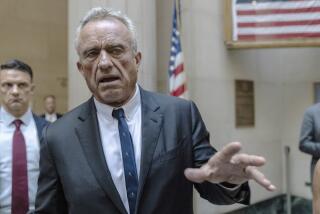Massachusetts Sen. Kerry Passes on Presidential Bid
BOSTON — After months of consideration, Sen. John Kerry of Massachusetts said Friday he will skip the 2000 presidential race.
At a news conference, the three-term Democratic senator cited fund-raising concerns and party unity as major factors in his decision not to run.
“I have concluded that to raise the necessary amount of money with only 10 months to do so, compounded by the newly accelerated primary schedule, is simply impossible at this time,” he said.
Kerry also said that pulling out of the race could help Vice President Al Gore win the Democratic nomination and “may be more helpful to our party’s efforts to win in November.”
Initially, Kerry had strongly considered challenging Gore, the Democratic front-runner, hoping to push for better early childhood education and health programs.
At the same time, he complained about the burden of organizing and raising more than $20 million, especially since the campaign period has been shortened by President Clinton’s impeachment trial.
Gore’s only announced competitor to date is former Sen. Bill Bradley of New Jersey, but Kerry’s decision is expected to prompt renewed consideration of the race by others, including Jesse Jackson.
“Other than Jesse Jackson, who could play a spoiler role and be an uncomfortable opponent for Al Gore, I think we have the field. This is a two-person field,” said Washington political consultant Stuart Rothenberg.
He speculated that Kerry may have been scared off by the apparent futility of a campaign against an incumbent vice president.
“I think the benefit to John Kerry of getting his name out would have been offset by getting defeated,” Rothenberg said. “Somebody like John Kerry is not going to go on a fool’s errand. He has too much at stake. Bradley has already cast himself as a political outsider; he has already left the institution.”
Kerry, 55, gained national prominence in the 1970s, when he returned from Vietnam as a decorated Navy veteran and promptly announced his opposition to the war. He co-founded Vietnam Veterans Against the War, and then made an unsuccessful bid for Congress in 1972.
More to Read
Get the L.A. Times Politics newsletter
Deeply reported insights into legislation, politics and policy from Sacramento, Washington and beyond. In your inbox three times per week.
You may occasionally receive promotional content from the Los Angeles Times.










